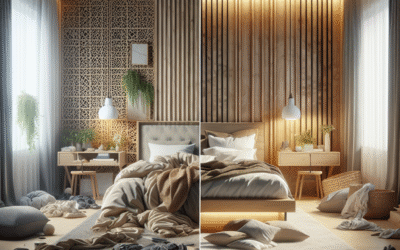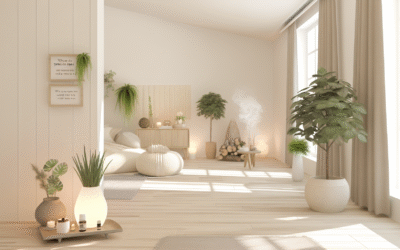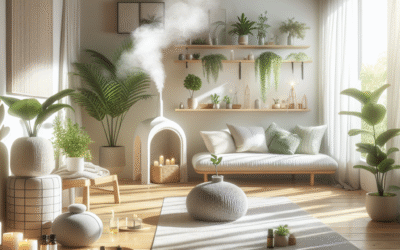
Creating Outdoor Art Studios With Natural Light Optimization
Imagine standing in an inspiring outdoor art studio where natural light dances across your canvas, igniting your creativity. Yet, many artists struggle to find the right outdoor space that harnesses sunlight effectively. This article dives into creating outdoor art studios with natural light optimization, providing invaluable insights for artists seeking to elevate their craft.
In this comprehensive guide, you will learn:
- Key principles of natural light optimization.
- Practical tips for studio layout and design.
- How to choose the right location for your outdoor studio.
- Essential materials and tools for setting up your space.
- Inspiration through real-world examples and expert advice.
By the end of this article, you’ll have the knowledge to create a welcoming and inspiring outdoor studio that maximizes the benefits of natural light.
Understanding Natural Light Optimization
The Importance of Natural Light in Art
Natural light does more than illuminate; it influences color perception and enhances creativity. Studies show that exposure to natural light can increase productivity by up to 15%, making it essential for artists.
Types of Natural Light
Understanding the difference between direct, indirect, diffused, and reflected light can help you design an optimal studio space. Direct sunlight can create harsh shadows, while diffused light provides a soft, even illumination ideal for many artistic mediums.
Factors Affecting Natural Light
- Time of Day: Morning light versus afternoon shadows.
- Seasonal Changes: Variability in daylight hours throughout the year.
- Geographical Location: Considerations based on your region’s climate and landscape.
Designing Your Outdoor Art Studio for Maximum Light
Choosing the Right Location
Location matters. A space facing east will receive abundant morning light, while a north-facing studio benefits from softer, consistent illumination. Consider nearby trees, buildings, and other structures that could cast shadows throughout the day.
Studio Layout Strategies
Utilize an open floor plan to enhance airflow and light movement. Position workstations near windows for optimal brightness. Incorporate reflective surfaces, like mirrors, to enhance natural light distribution.
Functional vs. Aesthetic Considerations
Your studio’s design should blend functionality with aesthetics. Mixing practical storage solutions with inspiring decor can energize your creative process without compromising workflow.
Essential Materials and Tools
Building Materials
Consider materials that can withstand outdoor conditions while visually complementing your surroundings. Cedar wood is both durable and attractive, while metal frames can offer modern appeal.
Natural Lighting Tools
Install skylights or large windows to enhance natural light. Utilize adjustable shades or blinds to manage light intensity as needed.
Portable Equipment
Invest in portable easels and furniture that can adapt to changing lighting conditions. Mobility allows you to reposition your setup for the best light throughout the day.
Real-World Examples and Inspiration
Case Study: The Outdoor Studio of Jamie Johnson
Artist Jamie Johnson transformed a simple backyard shed into a luminescent retreat. She installed skylights and large sliding doors that open to her garden, inviting tranquility and creativity.
Learning from Experts
Renowned architect Mark Lee emphasizes the integration of art and nature, encouraging artists to design studios that harmonize with their surroundings. This can lead to a deeper connection between the artist and their work.
Implementation Steps for Your Studio
Planning Your Space
Begin by sketching a rough layout of your desired studio. Consider factors from light optimization, storage needs, and aesthetic preferences.
Gather Your Resources
Compile a list of materials and tools needed. Research local suppliers or explore online marketplaces for the best deals.
Final Checks Before Constructing
Always check local regulations regarding outdoor construction. Getting the proper permits ensures you won’t face legal issues down the line.
Frequently Asked Questions
What are the best materials for an outdoor art studio?
Consider weather-resistant materials like cedar wood or treated metal frames. Both provide durability and aesthetic appeal.
How can I optimize light in a small space?
Use mirrors and light colors on your walls to reflect light. Position workstations near windows or skylights for better access.
What time of day is best for outdoor art?
The best time largely depends on your preference for light intensity. Morning light is softer, while afternoon can be brighter but may create shadows.
How do I control light in my studio?
Utilize adjustable shades or curtains. Incorporate materials that allow you to diffuse or block sunlight as needed.
Can I use an existing structure for my studio?
Yes! Converting an existing shed or garage can be a fantastic way to create a functional and inspiring studio space.
Conclusion and Next Steps
Creating outdoor art studios with natural light optimization involves thoughtful planning and design. By selecting the right materials, layouts, and tools, you can enhance your artistic environment. Remember, the ultimate goal is to inspire creativity in a space that feels revitalizing.
Ready to transform your creative space? Start small—choose one area and begin the process of optimization. For further reading, check out our articles on studio design and essential tools for artists.
Content Disclaimer
The information provided in this article is intended for educational purposes. For specific advice regarding personal projects, consult industry professionals.
Categories
- Accent Walls & Ceilings (61)
- Art Curation & Gallery (62)
- Bedding Style Trends (68)
- Bedroom Makeover (81)
- Bohemian & Eclectic Styles (58)
- DIY & Budget-Friendly Decor (64)
- Eco-Friendly Design (62)
- Furniture Care (71)
- Home Decor & Design Ideas (162)
- Home Wellness Spaces (59)
- Integrated Outdoor Living (67)
- Japandi Style (61)
- Kids and Nursery Decor (59)
- Living Room Decor (79)
- Mix & Match Techniques (73)
- Modern & Contemporary Design (66)
- Rug Sizing & Placement (73)
- Scandinavian Design Inspiration (20)
- Seasonal Home Decor (79)
- Small Space Solutions (73)
- Wall Art & Painting Tips (77)
Recent Comments
Archives
Product Gallery
-
Large Area Green Rugs for Bedroom Nordic Living Room Decoration Shaped Carpet Irregular Plush Lounge Rug Home Thick Washable Mat
Rated 5.00 out of 5$54.94 – $346.41Price range: $54.94 through $346.41 -
Nordic Style Rugs for Bedroom Morandi Living Room Decoration Carpet Large Area Geometry Lounge Rug Home Cloakroom Non-slip Mat
Rated 5.00 out of 5$39.46 – $597.66Price range: $39.46 through $597.66 -
Irregular Shapes Living Room Decoration Carpet Modern Style Rugs for Bedroom Home Thicken Plush Rug Fluffy Soft Lounge Floor Mat
Rated 4.83 out of 5$55.91 – $347.82Price range: $55.91 through $347.82














